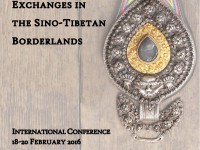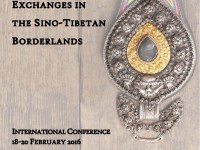For more information about the conference and the full programme, go to the conference dedicated Website: http://kham.sciencesconf.org

Most of the paper presentations have been video recorded and are available to be viewed using the links below (also available on Canal U).
For the full programme of the conference, see the flyer:
List of the videos, following the order of appearance on the conference’s programme:
F. Jagou: Manchu Officials’ Khams Travel Accounts: Mapping a Course Through a Qing Territory

E. Reynolds: Monasteries, Merchants, and Long Distance Trade: The Economic Power of Tibetan Monasteries in Northern Kham (1900-1959)

L. Galli: The Price of Enlightenment: The Travel Account of Kha stag ʼDzam yag, a Pilgrim and a Tshong dpon (1944-1956)

P. Giersch: Patterns of Inclusion and Exclusion Along Twentieth-Century China’s Southwestern and Tibetan Borderlands

J. Bray: French Catholic Missions and Sino-Tibetan Trade: Local Networks and International Enterprise

S. Relyea: Settling Authority: Sichuanese Farmers in Early Twentieth Century Eastern Tibet

M. Frank: Chinese Physiocracy: Kham as Laboratory for the Agrarian Theory of China

Y. Tsomu: Rise of a Political Strongman in Dergé in the Early Twentieth Century: A Story of Jagö Topden

D. Mortsensen: Wangchuk Tempa and the Control of Gyalthang in the Early-Twentieth Century

B. Chen: “House Society” Revisited

S. Gros: Matrifocality and the House in Drapa (Zhaba)

D. Drolma: The Renaissance of Traditional Dzongsar Craft-making in the Meshö Valley: An Insider’s Perspective on New Economic Processes and Identity Transformations in Sino-Tibetan Borderlands

I. Henrion Dourcy: Making Movies in the Gesar Heartland: The Burgeoning of a Kham Film Production in rDzogs-chen

E. Mortensen: Boundaries of the Borderlands: Mapping Gyalthang

T. Jinba: Two Gyalrong Weddings Under Fire: Rethinking of the Ongoing “Sinicization” and “Tibetanization” on the Sino-Tibetan Borderlands

K. Buffetrille: The Increasing Visibility of the Borderlands

February 18-20, 2016, Paris – France
The eastern Himalayan region lies at the crossroads—and at the borders—between what is conventionally recognized as Inner Asia (Tibet), East Asia (China), and South East Asia (Burma, North-East India). This international conference aims to explore the junction between these cultural, linguistic, and ethnic zones, and to establish better channels of communication between Chinese and Tibetan studies, but also studies on South East Asia, to help improve our understanding of this mountainous region.
Such an exploration prompts us to both decompartmentalize cultural areas and share key research topics. We wish to take into account works of reference about relationships to space and political and economic organization, such as the macro-regions of William Skinner (1964-1965), the galactic models of Stanley Tambiah (1976), the “geo-body” of Thongchai Winichakul (1994), or more recently the “Zomia” of Willem Van Schendel (2002) and James C. Scott (2009). Therefore, at the theoretical and methodological level, this conference sets out to critically review these formulations, while going beyond the separation into cultural areas that usually structures research in social science on mainland East Asia. In light of this, this conference seeks to provide an opportunity to pay particular attention to the part of the Sino-Tibetan borderlands that the Tibetans refer to as Kham. By considering this particular locale where specific identity, territorial, economic and social processes take place, this conference aims to provide a critical arena for a comparative and transdisciplinary approach to the multiple influences that have been at work in this borderland area.
This commits us to considering this region through its successive fragmentations and aggregations in its relationship with the neighboring centers of power—Central Tibet (Lhasa) to the west, and China to the east (Sichuan) and south (Yunnan)— and as a space made up of a set of multiple centers linked by communication and exchange processes. While there is still some resistance to a thorough investigation of the internal diversity of Tibet and its connections with the outside, we hope this conference will gather interest from scholars eager to contribute fresh, first-hand material to the socio-cultural diversity of Kham, in order to explore factors of unity and diversity that characterize this region and which are the source of its complexity. This collective endeavor, we hope, will help make a significant contribution to the definition of spaces, communities, identities and areas of influence on different scales and at different times in history.
As an outcome of the collaborative ERC-funded research project “Territories, Communities, and Exchanges in the Sino-Tibetan Kham Borderlands,” the conference will continue to explore four main transversal themes that have been topics of preliminary inquiries: 1) trade and commerce, 2) ethnicity, religion and local identities, 3) political entities and social organization, and 4) representations and cultural politics. These broad themes will guide us in deciding on the final composition of the conference panels.
To address these broad topics, we particularly welcome individual paper proposals that will tackle some of the following aspects on the basis of detailed ethnographic and/or historical data:
– The inter-ethnic ramifications of trade, including from an indigenous perspective, and how it is linked to political, familial, economic or even religious networks.
– The territorial inscription of political entities in Tibet before the 1950s and their mapping.
– The limits and boundaries of authority, power or influence in different historical contexts, and what has made and legitimized authority.
– The diversity of local forms of social organization and kinship systems.
– Comparative approaches to social morphology, kinship systems and marriage patterns.
– The political economy of identity politics of “borderlandness”: Intra-and-inter-borderland interactions and how they affect cultural, ethnic, religious, or political boundaries.
– Expressions of identity within their contemporary dynamics: The variations and tensions along identity boundaries and their non-congruence with those established from the outside.
– The unifying factors, whether symbolic or material, for examining the internally diversified borderlands.
– Alternative analytical frameworks to center-periphery or externalist terminology (e.g. borderlands, periphery, margins, etc.), that could help describe and analyze the complex landscape of borderlands, and re-centre our perspective on the encounters.
This is a small-scale conference that seeks to provide space for exchange and discussion to allow for some cross-fertilization, and therefore only a limited number of papers will be selected.
To submit your proposal please register on the conference website and submit your proposal online: http://kham.sciencesconf.org
Deadline extended to: November 20, 2015. (Individual paper proposals only, no panel proposal will be accepted.)
Decision expected by November 27, 2015.
Organizing Committee
Stéphane Gros (convenor)
Rémi Chaix
Lara Maconi
Kunsang Namgyal Lama
Scientific Committee
David Atwill, Pennsylvania State University
Rémi Chaix, Centre Nationale de la Recherche Scientifique
Chen Bo, Sichuan University
Patrick Booz, Pennsylvania State University
Katia Buffetrille, Ecole Pratique des Hautes Etudes
Stéphane Gros, Centre National de la Recherche Scientifique
Guillaume Jacques, Centre National de la Recherche Scientifique
Tenzin Jinba, Lanzhou University / Singapore National University
Fabienne Jagou, Ecole Française d’Extrême-Orient
Kunsang Namgyal Lama, Centre National de la Recherche Scientifique
Lara Maconi, Centre National de la Recherche Scientifique
Yudru Tsomu, Sichuan University
View online : Conference Website

